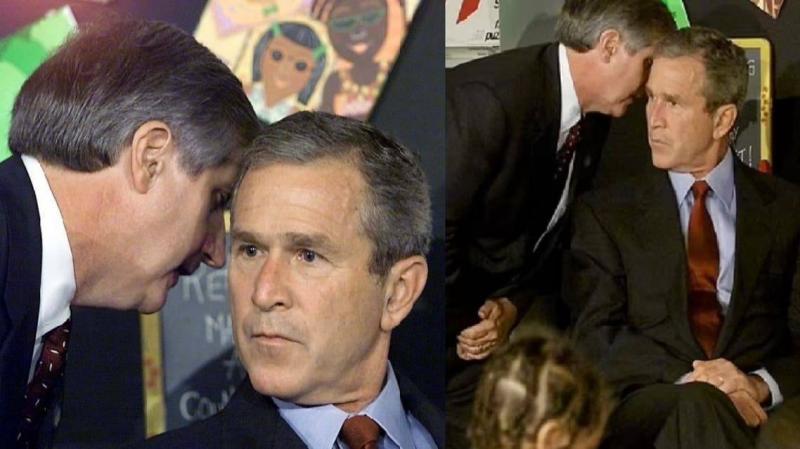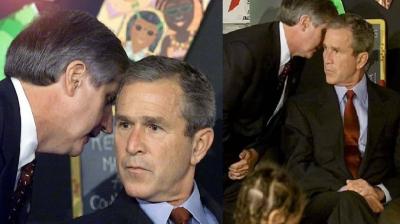Tuesday, September 11, 2001, began like any ordinary day in the United States, especially since President George Bush had received a security briefing from the CIA the day before, informing him, as other security briefings from the FBI and others did, that there was no significant threat facing the world's largest country and its new president. However, intelligence reports from the world’s most prominent security agencies are not always accurate.
On the morning following these briefings, which will mark the 20th anniversary of the events this coming Saturday, Bush visited an elementary school in Sarasota, Florida. He sat watching what the children were doing in one classroom, according to video footage broadcasted by "Al Arabiya" below. Suddenly, one boy appeared on the screen during the live broadcast and leaned in to whisper in the president's ear. With just a few words, this whisper would become the most famous one in modern history—and it was terrifying.
Before entering the classroom, Bush was seated in a school lounge, waiting for his meeting with the students. When he stood up to enter, he saw on a nearby television a "small plane" crash into one of the towers of the World Trade Center in New York, and at first, he thought, like millions who watched the breaking news on American television and others, that it was a small training plane that had experienced some kind of malfunction, until a second plane hit the second tower of the "World Trade Center." It was at this moment that he was informed the plane was a passenger aircraft like the first one and that "America is under attack, possibly terrorist," as stated.
He appeared uncertain as to where to look. The whisper came from Andrew Card, who served as White House Chief of Staff from 2001 to 2006 during Bush's presidency, as well as the head of his "Iraq Group." The information conveyed to the president quickly changed his expression; when captured on video, he appeared stunned and silent, his pupils dilated, and he seemed disoriented, attempting to remain composed in front of the children until the end of the meeting so as not to instill in them a lifelong sense of worry.
The first plane, a Boeing 767 belonging to American Airlines, was hijacked by five individuals from a total of 19 recruited by the "Al-Qaeda" organization for a series of suicide operations, led by Egyptian Mohamed Atta, who piloted the aircraft that crashed into the north tower at 8:46 a.m. Following this, three other planes were hijacked, one of which was of the same model and from the same airline, crashing into the south tower 17 minutes later. The towers collapsed in a scene that appeared on television screens as if a world war had erupted suddenly amid a nuclear attack.
A third hijacked plane, a Boeing 757 also belonging to American Airlines, crashed into the wall of the Pentagon in Arlington, Virginia, while a fourth plane of the same model, belonging to United Airlines, crashed in a field in Pennsylvania, with 80 passengers on board, before it reached its believed target, the White House in Washington. These consecutive attacks, unforeseen by anyone, resulted in the deaths of 2,973 people, including 2,753 in New York alone, changing the world and leaving lasting repercussions that are still felt today.
On Wednesday, the American television network Fox News published the results of a survey it conducted with 1,002 participants, which "Al Arabiya" reviewed on its site. The survey summarized that 64% of Americans believe the attacks changed life in their country forever, while 24% stated that they caused temporary changes, and only 9% felt that nothing had changed at all.




